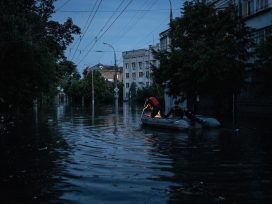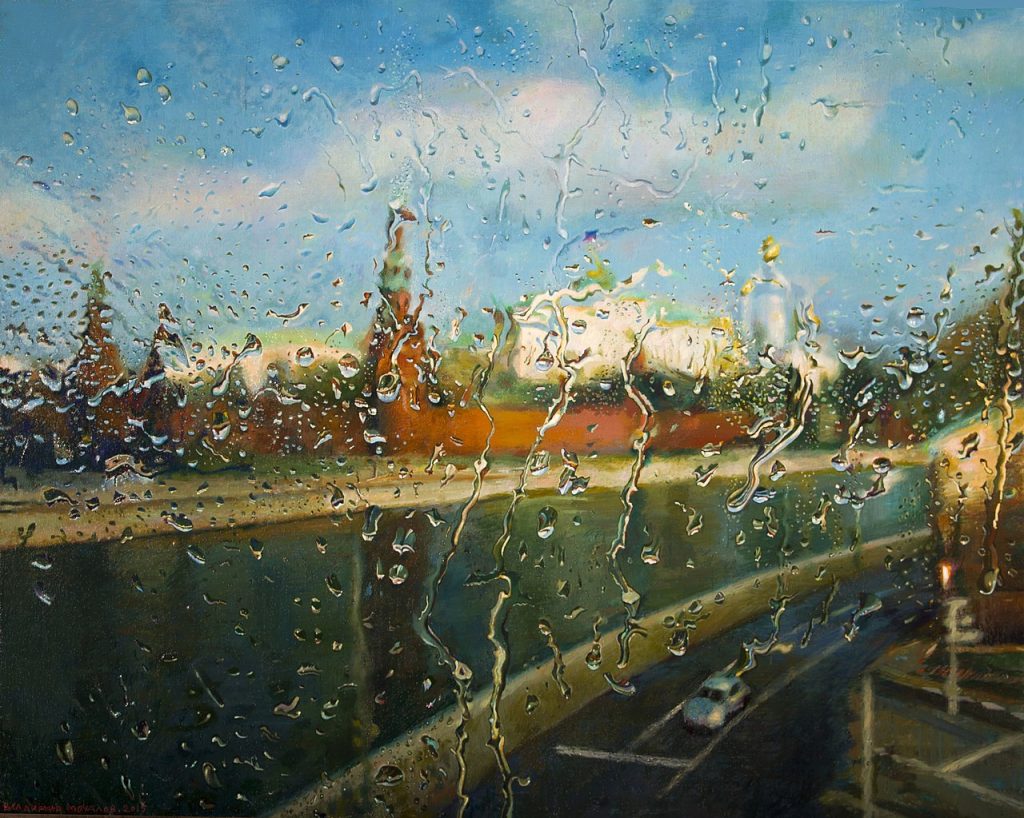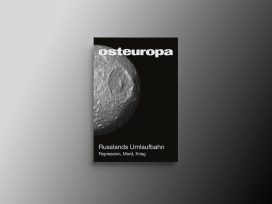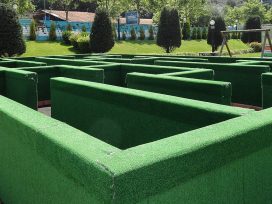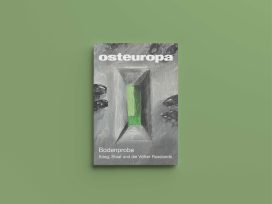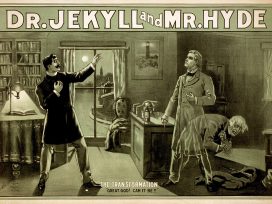After reading Giuliano da Empoli’s novel Le Mage du Kremlin (‘The Wizard of the Kremlin’), last year’s publishing sensation in France, I found myself waxing nostalgic for the halcyon days of the roman à clef. The rule used to be to depict real people thinly disguised as fictional characters. In 1946, American readers of Robert Penn Warren’s All the King’s Men easily guessed that the prototype of Governor Willie Stark was Senator Huey Long. Fifty years later, they recognised Bill Clinton camouflaged as Jack Stanton in Primary Colors. The identity of the main protagonist in O: A Presidential Novel (2011) was blatantly transparent.
In his novel dedicated to the man some have called ‘Putin’s Rasputin’, da Empoli has killed the genre. There is no guesswork required of the reader here. Except for the hero, Vadim Baranov, all the protagonists bear their real names – including Vladimir Putin. Da Empoli also describes actual events, fictionalising them and altering the chronology in which they occurred. He is no pioneer when it comes to this approach – on the contrary, he is following the trend set by recent biopics such as The Crown. Still, the question remains how to interpret the novel.
The premise
The main protagonist, Vadim Baranov, is inspired by Vladislav Surkov, the former Kremlin ideologue, spin doctor, presidential adviser and éminence grise. The life of the real Surkov certainly provides rich material for fiction. Before entering politics, he was at various times a serial college dropout, a writer of lyrics for rock bands, a bodyguard and a PR manager. After being propelled to the summit of the Russian state, he became a precursor of political adventurers such as Steve Bannon and Dominic Cummings.
A witty dilettante and a cynical provocateur, Surkov famously coined the concept of ‘sovereign democracy’ – a euphemism for the increasingly authoritarian character of Putin’s rule. He positioned himself as an intellectual and wrote two novels – unlike da Empoli under a pen name. Surkov liked to rub shoulders with pop stars and other cultural celebrities. But his attempt to control the creative classes of Russia by offering them a deal – ‘leave the politics to us, and you can do whatever you want’ – ended with the anti-Putin protests of 2011.
From 2013 onwards, Surkov occupied himself with the ‘Ukrainian question’. In 2019, he convinced Putin that Volodymyr Zelenskyy, the inexperienced president of Ukraine, would knuckle under. But the meeting between Putin and Zelenskyy in Paris in December 2019 was a monumental failure. To the Russians’ surprise, the Ukrainian president refused to cede ground in negotiations on the sovereignty of his country. In 2020, Surkov was exiled from the Russian Olympus and allegedly spent some time under house arrest. The almighty sorcerer of the Kremlin had proven no more substantial than the Wizard of Oz.
The fictional Baranov is not in the same class as the shrewd, cynical manipulator Surkov, and the plot of da Empoli’s novel isn’t remotely convincing. A French intellectual visiting Moscow to research Russian literature responds to a witty tweet posted by someone using an alias. In his answer, the Frenchman mentions Yevgeny Zamyatin’s classic dystopian novel We. The mysterious owner of the Twitter account, who proves to be Baranov, is so surprised that a westerner is reading Zamyatin that he invites him to his home.
A chauffeured car delivers the literary scholar to Baranov’s opulent mansion. After a short conversation about Zamyatin, the ostracised wizard of the Kremlin decides to confess his sins to his random guest. Baranov’s de profundis covers most of his life, from his childhood through to his political demise. The entirely fantastical autobiography includes the account of an ongoing but rocky affair with the imaginary wife of the real oligarch Mikhail Khodorkovsky. The central part of the confession, however, is a fictionalised take on the landmarks of Putin’s presidency, from its beginning in 2000 through to the war in Donbas in 2014.
Becoming Baranov
Da Empoli’s imperfect knowledge of Russian realities is combined with an exoticising zeal. He is a true heir to the tradition of the French ‘orientalist’ writings about Russia established in the 19th century: think, for example, of Alexandre Dumas’s Impressions de voyage: En Russie. Da Empoli shares with Dumas a passion for couleur locale, resulting in some peculiar errors.
He has decided to give his protagonist’s pedigree an upgrade. Unlike Surkov, whose parents were schoolteachers in the Chechen village in which he grew up, Baranov is the scion of nobility. We learn that his grandfather was accepted into the Imperial Guard in 1914 despite lacking a military education, but there is no mention of how this proud aristocrat survived the revolution and the Stalinist purges. He lives in an izba (a traditional Russian log house) constructed of poplar logs (poplar is never used for construction because it shrinks as it dries). His spacious home has a large fireplace (never used in Russian rural dwellings, which were equipped with stoves). The old leather armchairs, French library, and unavoidable samovar all add the charm of à temps perdu.
The customs observed by this gentleman are no less fantastical. His occupation isn’t revealed; the only thing we know is that he is a passionate hunter who loves shooting wolves. He and his companions have the habit of throwing bottles of vodka around the garden in the autumn, and then recover them when the snow melts in the spring. What inspired da Empoli to invent this strange exercise in self-restraint, which contradicts all the traditions of alcohol consumption in Russia, is a mystery.
But while Baranov’s grandfather lives in internal emigration on the outskirts of some godforsaken village, his father – magically transformed into a member of the Soviet nomenclature – is the director of the Academy of Social Sciences of the Central Committee. Baranov wistfully recollects shopping at Spetsraspredelitel (the food store for party apparatchiks) on Granovsky Street in Moscow, where he chose delicacies such as Azeri oranges and lamb pies. (Never mind that customers at Spetsraspredelitel couldn’t choose their groceries but received sealed paper bags containing a multi-course meal.) Baranov confesses to his guest that he never felt such ‘absolute power’ as during those days.
Although something of a digression, the description of the protagonist’s Soviet childhood leads us to one of the essential tropes of the novel. Da Empoli uncritically exploits the theme of Soviet nostalgia and the tragedy of the ‘generation of fathers’, who after the collapse of the USSR found their world shattered. At one point he refers to the modest rewards that made up the Soviet dream:
…a respected profession as a civil servant or teacher, a small Zhiguli car, a dacha in the countryside with its own vegetable garden, a holiday in Sochi or occasionally Varna, with feet dipped in the Black Sea and the prospect of a good meal with friends. And yet this model had its own strength and dignity. Its heroes were a soldier and a schoolteacher, a truck driver, and a tireless worker: posters in the streets and underground stations were dedicated to them.
The author seems unaware that ownership of a Zhiguli and holidays in Varna were symbols of privilege inaccessible to workers, no matter how tireless. The shortage of both cars and holidays was one of the causes of the collapse of the USSR – neither the system’s ‘strength’ nor its ‘dignity’ spared it.
Baranov’s father is dying in the Kremlin hospital, disillusioned and bitter, deprived even of a state funeral. But Da Empoli doesn’t understand that the upper crust of the Soviet establishment easily adapted itself to the circumstances of post-communist Russia. For example, after the Academy of Social Sciences was disbanded in 1991, Yury Krasin, the real rector, forged a spectacular career as an academic.
The martyrology continues into the chaotic 1990s, when the country was ruled by oligarchs and gangsters and humiliated by the West. Da Empoli/Baranov supplies plenty of lurid details, mentioning for example the glamorous escorts ‘selected from the four corners of the empire’ that followed Khodorkovsky everywhere. Baranov tells his guest that in those days it was possible to meet a friend on the street and wake up in Courchevel, surrounded by naked beauties. Or to get talking to an inebriated stranger at a strip club and the next day find yourself in charge of a communication campaign ‘worth millions of rubles’. This may sound impressive, but according to the 1995 exchange rate, a million rubles was equivalent to just $200. And while wealthy Russians did indeed start frequenting top-end French ski resorts in the ’90s, to get there you still needed a foreign passport with a valid EU visa.
Da Empoli’s penchant for exaggeration is accompanied by a weak grasp of fact. Describing the rise of Russia’s nouveau riche, for example, he claims that Komsomol apparatchiks could make fast money in the late-1980s because student cooperatives were the only private enterprises permitted. Actually, anyone could legally start a business at that time.
Baranov comes to understand that the only escape from the bloody anarchy of the ‘fatal 1990s’ is authoritarianism: ‘The vertical of power is the only satisfactory answer, the only one capable of alleviating the suffering of a man subjected to the cruelties of the world.’ Gleb Pavlovsky – the Putin advisor and ‘political technologist’ who coined the term ‘power vertical’ – fortunately doesn’t make an appearance.
The new tsar
In the 2000s Baranov resumes his political career as broadcaster at a leading TV channel. Da Empoli describes the infamous 2008 TV contest ‘The Name of Russia’, whose aim was to determine the most popular figure from Russian history. He correctly notes that the channel ended up having to manipulate the results because Stalin came top. But da Empoli moves the competition back to the mid-1990s, without considering that the winner would almost certainly have been different then.
The central part of the novel is dedicated to the rise of Vladimir Putin and his relations with Surkov/Baranov. The narrator creates a hagiography of the Russian president that borders on unintentional parody. The Putin of the novel, whom Baranov calls ‘the tsar’, is an ascetic interested only in power and the greatness of the Russian state. He sees the latter as being constantly humiliated by US presidents, NATO and everybody else. The description of Putin demanding a bowl of porridge in an upscale Moscow restaurant would provoke a smile from a Russian reader. No less improbable is the future president’s warning to Baranov that anyone serving the state must put the public interest above their own.
Da Empoli’s Putin is a reincarnation of Ivan the Terrible. After all, this is a stereotypical world in which Russians need a strong hand and the Kremlin is a mystical centre of power:
Those who inhabit the Kremlin are the masters of the time. Around the fortress, everything changes, but inside, life seems to come to a standstill … For centuries, everyone who crossed the threshold of the giant stone fortress which Ivan the Terrible wanted to place in the centre of Moscow felt the hand of boundless power, accustomed to controlling the destinies of people with the ease with which a child is stroked on the head.
This poetic description has only one fault: while Ivan did indeed reconstruct the Kremlin, turning it into a fortress, it was the Grand Prince of Moscow Ivan III, also known as Ivan the Great, who died 25 years before Ivan the Terrible was born.
Putin, the contemporary tsar, talks a lot in da Empoli’s novel. He explains to Baranov the basics of absolute power and repeats all the grievances familiar to us from his speeches. The new tsar has learned a lesson from Stalin, whose tactics he elucidates: ‘He takes von Meck, the railway boss, and shoots him for sabotage. This doesn’t solve the problem of the railways. In fact, it may make the situation worse. But it does give an outlet for anger’.
The problem here is that Nikolai von Meck (1863–1929) was not the railway boss but a mere consultant to the financial and economic department of the People’s Commissariat of Communication Routes. His ‘bourgeois’ origin made him the perfect scapegoat to accuse of leading an anti-Soviet plot. Is da Empoli making an ironic point about Putin’s historical knowledge, or simply revealing his own disregard for fact? We can only guess.
The tsar of the novel is a demonic creature with a piercing gaze and anthracite eyes (though when George W. Bush looked into them and ‘was able to get a sense of his soul’, they were watery-blue). Putin feels constantly offended and complains that western leaders treat him no better than the president of Finland. (If only he remotely resembled Sauli Niinistö!) The tsar has no friends and no allies: he believes the whole world is trying to diminish the great nation of Russia in general, and him especially. Baranov ends up being convinced that Putin is doomed to loneliness. The only creature he trusts is his black Labrador Koni (whose name is misspelt throughout the novel with a double ‘n’).
The fictional Putin is surrounded by no less fictionalised real characters: they include Boris Berezovsky, the oligarch who falls from grace; Igor Sechin, the acolyte of the president and head of Rosneft; and Alexander Zaldastanov, leader of the hyper-nationalist ‘Night Wolves’ biker club. In the wonderland of Le Mage du Kremlin, Berezovsky speaks with an upper-class English accent (tell that to the High Court judges in London); Sechin buys a castle in Ireland (not the country of choice for Russian oligarchs); and Zaldastanov (a showman who has never seen action in his life) becomes a war hero in Donbas.
Harmless fiction?
Da Empoli’s factual errors are too many to enumerate here. But must a novel, a work of the creative imagination, be true to the facts? Da Empoli says his creation is a fiction, but really it is a hodgepodge of true events liberally spiced with orientalist fantasies. One reviewer has said of the book that ‘reality and fiction flow into one another’. But the problem is that the fictionalised ‘truth’ is taken as an objective description of the Putinist state.
Da Empoli denies accusations that his book is sympathetic to Putin. Instead, he claims that it is a warning. But the novel clearly romanticises Russian self-pity. There is no mention of the steady drumbeat of propaganda that he has transformed into prose. Cécile Vaissié, a respected historian of Russia, has aptly described the book as ‘Russia Today for Saint German-des-Prés’. If someone were to write a novel about Hitler and Goebbels and have them mouthing quotes from Mein Kampf and the Völkischer Beobachter, the effect would be comparable.
But the most alarming thing about da Empoli’s book is the reception it has found in France. One of the reasons the political class embraced was surely because its message chimed with Macron’s entreaty not to ‘humiliate’ Russia. No one is trying to ‘understand’ Putin anymore. But we need to remember that the road to today’s war was paved with pleas for respect for Moscow’s ‘legitimate’ grievances. Set beside the horrors we see unfolding, the evil described in Le Mage du Kremlin seems like nothing but a cheap imitation.
